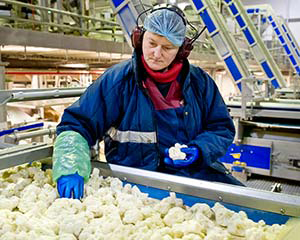Disappointing third quarter figures have prompted Sint-Katelijne-Waver, Belgium-headquartered Greenyard NV to revise its full-year profit outlook and assemble a transformation team to implement a turnaround plan that could include the raising of additional capital.
 In a press release issued on January 28, the vegetable and fruit production and marketing company reported that Q3 results were “lower than expected, mainly due to continued pressure in the food retail landscape, predominantly in Germany and Belgium.”
In a press release issued on January 28, the vegetable and fruit production and marketing company reported that Q3 results were “lower than expected, mainly due to continued pressure in the food retail landscape, predominantly in Germany and Belgium.”
Investors reacted negatively to the announcement, as the stock price plummeted by more than 25%, dropping €1.97 per share to €5.70 on the Euronext Brussels Exchange. It was the lowest quote in the last 52 weeks of trading, during which time the high point was €21.60.
Greenyard reported that despite a pickup in business last September and October, increasing price pressure in fresh product categories during November and December, along with rising quality and service requirements from retailers in both fresh and frozen (long fresh) market segments, are pushing up suppliers’ costs and waste levels.
As a consequence, the press release stated: “Sales are lagging behind last year by -4.5% and has, more importantly, an impact on margin generation given that Greenyard operates at limited percentage margins. Therefore, Greenyard revises its REBITDA forecast for AY 2018/19 to a range of €60-65 million, after deconsolidation of [its] horticulture segment [holding], which was sold end the end of 2018 [for £120 million].”
While third quarter sales numbers were not detailed, the latest downturn followed a 3.6% drop in sales to €1.98 billion during the first half of the year through the end of last September. During that period REBITA fell nearly 40% to €41.2 million and a total loss of €113 million was posted.
Heading up Greenyard’s transformation team is Marc Zwaaneveld. He is described “a seasoned senior manager with a proven track record” whose new team “is developing a comprehensive turnaround plan which will include actions that will be implemented immediately.”
Part of the plan involves transitioning the organization into a vertically integrated partner for its retail customers.
“Greenyard strongly believes that the fruit and vegetables market of the future will be operated more efficiently by a limited number of large players that partner closely with their customers,” stated the press release. “In the short term, this brings challenges and requires a new way of working in the market. However, in the longer term, the partnership model will reduce waste, improve quality for the consumer and improve margins in the value chain.”





